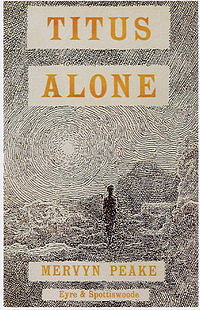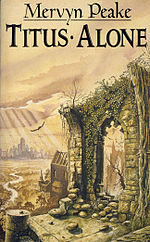- Titus Alone
-
Titus Alone 
First 1959 edition coverAuthor(s) Mervyn Peake Country United Kingdom Language English Series Gormenghast Genre(s) Gothic Publisher Eyre & Spottiswoode Publication date 1959 Media type Print (Hardback & Paperback) ISBN NA Preceded by Boy in Darkness Followed by Titus Awakes Titus Alone is a novel written by Mervyn Peake and first published in 1959. It is the fourth work in the Gormenghast series. The other works in the series are Titus Groan, Gormenghast, the novella Boy in Darkness, and the fragment Titus Awakes.
Contents
Plot summary
The story follows Titus' journey in the world outside Gormenghast Castle, having left his home at the end of the second book.
He bumbles through a desert for a time, then uses a canoe to row down the river, where the reader gets a surprise---although Gormenghast is a crumbling, medieval castle, Titus finds himself in a modern city. Skyscrapers tower, and the river itself is covered in pipes, canals, and fishermen. As he slips the painter on the canoe, he has his first encounter with two faceless, silent persons, ostensibly police officers.
Later on, Titus becomes friends with a man named Muzzlehatch, who runs a zoo and drives a shark-shaped car. He meets and has an affair with, Muzzlehatch's former lover, Juno. Titus walks down a crumbling highway, where he has an unpleasant encounter with a beggar that eats money. He even spends some time wandering around the Under-river, an underground city filled with outcasts, runaways, and derelicts. There, (yet another contrast to the antiquity of previous novels), someone informs us that 'Molusk' has just circled the moon, probably a kind of metal-plated satellite.
Titus eventually is found in a state of fever by a woman named Cheeta, who is the daughter of a scientist who runs a light-bulb equipped factory filled with mysterious bad smells, and who talks to his workers through a giant television set. Cheeta is described as a 'modern girl' with 'a new kind of beauty', who drives a helicopter. Titus lusts for her because he has spent all his life in a tight-laced Medieval castle, and Cheeta lives like science incarnate. Although Titus lusts for her body, he also tells her several times that he hates her and tells her to 'go home to your horde of vestal virgins and forget me as I shall forget you.' Cheeta is shocked because other men would give anything for her favor. She contrives an elaborate plan to lure him into the "Black House", to see 'a hundred bright inventions', and end their relationship on a high note. There, she attempts to recreate Gormenghast horrendously, but is foiled by Muzzlehatch, who dies in the effort. Muzzlehatch also manages to blow up Cheeta's father's factory as revenge for the murder of his animals. Titus flees and spends months wandering a wasteland alone, until he comes across a large rock that he knew from his childhood. Hearing the guns of Gormenghast saluting the missing Earl, he is confirmed in his knowledge that he is not insane and that the Castle exists. Tempted to return to his duties, he nevertheless confirms his desire for independence and once again strikes off alone, this time in a different direction.Themes and Motifs
One possible theme is ancients versus moderns, a theme that has existed since the time of Swift. Titus only wants Cheeta because she is a modern girl surrounded by dazzling technology, and her father is an innovative scientist who runs a mass-production factory, and he's spent all his life in a moldy, antiquated castle run by tradition. But after having a long affair with Cheeta, he seems to realize she is self-centered and cruel, and rejects her. Cheeta becomes treacherous and vengeful and uses her technology and resources to hideously recreate Gormenghast, and she thinks nothing of it. Furthermore, even though her factory is efficient, sleek, and modern, it never seems to do anything. The most the scientists manage to accomplish is ruin Muzzlehatch's future by using a death ray to burn his zoo. As David Louis Edelman notes, the prescient Steerpike never seems to be able to accomplish much either, except to drive Titus' father mad by burning his library. The general theme, therefore, would seem to be that the false allure of the future is as dangerous and stupid as the false allure of the past.
Critical reception
This last book is a strange and unpolished piece of work, due to Peake's illness during its writing. The book's publication was met with scathing rejection by critics.[citation needed]
The first edition contains many changes wrought by a heavy-handed editor, including the omission of entire chapters. The editor also removed various references to modern technology such as helicopters and cars. Critical reception has been more mixed since the complete novel was published.[citation needed]
External links
Categories:- Gormenghast
- Gothic novels
- Fantasy novels
- 1959 novels
- British novels
- Novels by Mervyn Peake
- Steampunk novels
- 1950s fantasy novels
Wikimedia Foundation. 2010.

